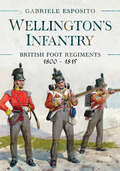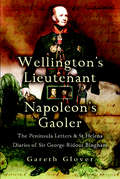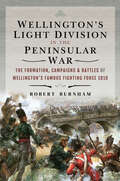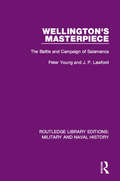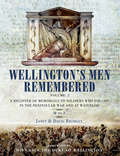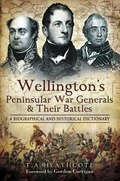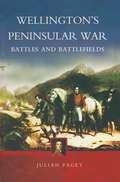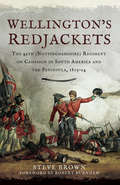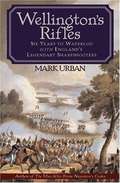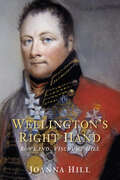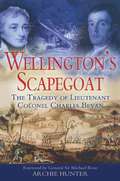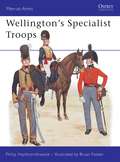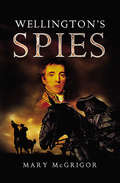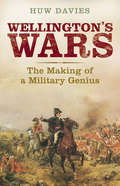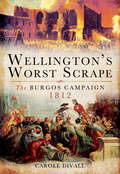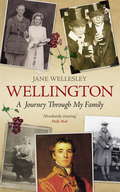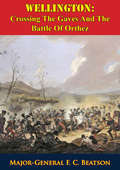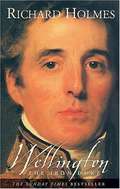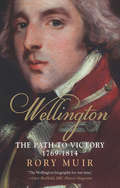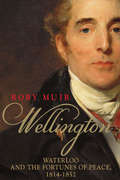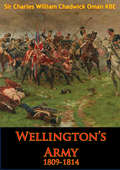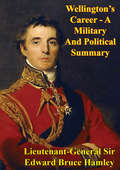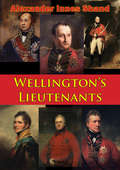- Table View
- List View
Wellington's Infantry: British Foot Regiments, 1800–1815
by Gabriele EspositoThis illustrated history presents a detailed overview of the British infantry’s organization, uniforms, and equipment during the Napoleonic Period.The years from 1800 to 1815 were one of the most glorious periods for the British Army—and the infantry was its backbone. Lavishly illustrated with color artwork, this book examines how the foot regiments evolved to absorb the lessons of defeat in America, transforming them into the efficient and dependable bedrock of victory in the Napoleonic Wars. Historian Gabriel Esposito details the uniforms, equipment, and weapons of the infantry, along with their organization and tactics. Chapters are devoted to the Guards, the line regiments of foot, the Light Infantry and Rifles, as well as Highland and Lowland Scots regiments.Esposito considers not only those units serving with Wellington in the Peninsular War and the Waterloo Campaign, but all British infantry units, including those in Canada, the West Indies, India and elsewhere—including the home defense Fencibles. Foreign units serving with the British army, most notably the King's German Legion, are also included.
Wellington's Lieutenant Napoleon's Gaoler: The Peninsula Letters & St Helena Diaries of Sir George Rideout Bingham
by Gareth GloverThe Author wrote numerous letters home from the campaigns that he fought with Wellington in the Peninsular when he was commanding his Regiment. He was therefore in a senior position and privy to secrets of the war. He is often caustic regarding his superiors including The Iron Duke himself. He packs his letters with interesting descriptions of the life and his surroundings.Once Waterloo was won and Napoleon defeated and captive, Bingham was selected to accompany him on his journey on HMS Northumberland to final exile at St Helena.. There he remained with his captive until relieved by another officer(Sir Pine-Coffin) in 1818. The diary for this period is full of fascinating descriptions of the deposed Emperor and the habits of him and his staff.
Wellington's Light Division in the Peninsular War: The Formation, Campaigns & Battles of Wellington’s Famous Fighting Force, 1810
by Robert Burnham“A detailed and riveting account of the Light Division and its three regiments, 43rd and 52nd Light Infantry and the 95th Rifles . . . An important book.” —FiretrenchIn February 1810, Wellington formed what became the most famous unit in the Peninsular War: the Light Division. Formed around the 43rd and 52nd Light Infantry and the 95th Rifles, the exploits of these three regiments is legendary. Over the next 50 months, the division would fight and win glory in almost every battle and siege of the Peninsular War.How the division achieved its fame began on the border of Spain and Portugal where it served as a screen between Wellington’s Army and the French. When it came time pull back from the border, the division endured a harrowing retreat with a relentless enemy at their heels. It was during this eventful year it developed an esprit-de-corps and a belief in its leaders and itself that was unrivaled in Wellington’s Army.Wellington’s Light Division in the Peninsular War uses over 100 primary sources—many never published before—to recount the numerous skirmishes, combats, and battles, as well as the hardships of a year of duty on the front lines. Others are from long-forgotten books published over 150 years ago. It is through the words of the officers and men who served with it that this major, and long-anticipated study of the first critical year of the Light Division is told.“Given the limited scope of the book, covering only one year of the Peninsular campaign, the depth of the study is truly remarkable . . . An excellent history of the Light Division ‘Warts and All.’”—The Napoleon Series
Wellington's Masterpiece: The Battle and Campaign of Salamanca (Routledge Library Editions: Military and Naval History #17)
by Peter Young J. P. LawfordThe Peninsular war was not only one of the great periods in British military history, it was also a war in which guerillas exerted a major influence, and as such, has continued relevance today. Salamanca established Wellington as one of the great military commanders of any age and it is one of the battles which produced significant results. As well as the battle the campaign contains two of the most memorable sieges ever under-taken by British arms, those of Ciudad Rodrigo and Badajoz. This book, originally published in 1972, uses eye-witness accounts with the result that the reader can hear the principal characters explain their actions and see the battlefield through the eyes of the men who were there.
Wellington's Men Remembered Volume 2: A Register of Memorials to Soldiers Who Fought in the Peninsular War and at Waterloo: M to Z
by David Bromley Janet BromleyWellington's Men Remembered is a reference work which has been compiled on behalf of the Association of Friends of the Waterloo Committee and contains over 3,000 memorials to soldiers who fought in the Peninsular War and at Waterloo between 1808 and 1815, together with 150 battlefield and regimental memorials in 24 countries worldwide.
Wellington's Peninsular War Generals & Their Battles: A Biographical and Historical Dictionary
by T. A. HeathcoteWellington's achievements in the Peninsular War cannot be overestimated. At the outset in 1808 Napoleon and his Marshals appeared unstoppable. By the close Wellington and his Army had convincingly defeated the French and taken the war across the Pyrenees into France itself. He and his Generals had waged a hugely successful campaign both by conventional means and guerrilla warfare.This book contains the pithy biographies of some forty senior officers who served Wellington, in the majority of cases, so ably during this six year war. Many had experience of battle prior to the Peninsular and went on to greater heights thereafter. There is a section summarizing the major engagements that this 'band of brothers' took part in. The book is arranged in alphabetical order and each thoroughly researched entry places its subject's life in his historical and political context. The result is a highly entertaining, informative and authoritative book.
Wellington's Peninsular War: Battles and Battlefields
by Julian PagetThis history and battlefield guide is an essential reference for anyone visiting the sites of Wellington&’s war with Napoleon in Spain and Portugal.Wellington's Peninsular War provides a concise and comprehensive account of the battlefields as they exist today, with historic context and practical details to help readers find and explore them. The Peninsular War of 1808 to 1841 was a major part of the twenty-year struggle against Napoleon Bonaparte&’s imperial ambitions. Military historian Julian Paget presents a balanced picture of the conflict, covering the Duke of Wellington&’s campaigns as well as the crucially important efforts of the Spanish and Portuguese. Paget begins with an overview of the war and its background, followed by a complete year-by-year account. He then presents a chapter on each of the major battles, includes maps and photographs of the battlefields, orders of battle, and helpful information about the battlefield today. The maps show the ground as it was at the time but also include modern features for easier identification.
Wellington's Redjackets: The 45h (Nottinghamshire) Regiment on Campaign in South America and the Peninsula, 1805–14
by Steve BrownThe assault was failing. Wellington's men had stormed the walls of the great frontier fortress of Badajoz only to be beaten back with terrible losses. Then on the keep of the old castle the French flag was torn down and a British officer's red jacket was hauled up the flagpole. It was the signal the British were inside Badajoz!This was one of the most famous incidents during the Peninsular War and marked not only the turning point in the capture of Badajoz but of the entire conflict. The jacket belonged to Lieutenant James MacPherson of the 45th (Nottinghamshire) Regiment. The 45th had landed with Wellington at Mondego Bay in 1808 and fought with him throughout the entire Peninsular War gaining more battle honours than any other line regiment.Wellington's Redjackets, The 45th (Nottinghamshire) Regiment on Campaign in South America and the Peninsular War is one of the most detailed unit histories ever published of a regiment during the Napoleonic era. As the first, and only, study of this regiment, Wellington's Redjackets will undoubtedly be an essential purchase for those interested in Napoleonic warfare.
Wellington's Rifles
by Mark UrbanHistory of the Napoleonic War as it effected six of Wellington's soldiers. History becomes personalized as the author draws upon letters and diaries to weave his story.
Wellington's Right Hand: Rowland, Viscount Hill
by Joanna HillOne of the most unlikely soldiers of his day, General Rowland Hill, 1st Viscount Hill of Almarez was imaginative, brave – and perhaps more surprisingly for the period in which he lived and fought – compassionate towards those under his command. This is the compelling story of one of history’s forgotten heroes, a man who frequently led from the front in some of the deadliest battles of the Napoleonic Wars. Hill was given his own ‘detached’ corps and fought his way through Spain, Portugal and France, winning battles against the odds – such at St Pierre, where he defeated the redoubtable Marechal Soult when outnumbered two to one. When ministers at home asked that Hill be allowed to leave the Peninsula and lead an army elsewhere, Wellington dismissed the idea with ‘Would you cut off my right hand?’Hill fought at Roliça, Corunna, Talavera, Bussaco, Almarez, Vitoria and Waterloo. He succeeded the Duke in 1828 as Commander-in-Chief of the forces and served as such until he resigned in 1842, a period marked by civil unrest that he reluctantly was obliged to confront. Based upon the Hill papers and a wide range of other primary sources, Wellington’s Right Hand is an important addition to the literature of the Napoleonic age and in particular to that of the Peninsular War.Writer and historian Joanna Hill is the great, great, great niece of Rowland Hill and as such has gained unique access to the Hill family archives. In April 2005, she published her first book on the Hill family, The Hills of Hawkstone and Attingham; the Rise, Shine and Decline of a Shropshire Family.Serendipity has sometimes led her life in the footsteps of her illustrious ancestor. While working at the Institute of Fine Arts, New York University’s post graduate department for the history of art and archaeology, she spent three very hot seasons excavating in the Nile Delta of Egypt, a few kilometres from the site of one of the General’s very first battles, at Aboukir in 1801. She currently lives with her husband (and an international champion Skye terrier, Dougal) in a 13th-century hilltop bastide village in South West France. This is just a short distance north of St Pierre d’Irube at the foot of the Pyrenees, where Rowland Hill won his very own general action in the closing stages of the Peninsular War in December 1813. When the victorious British cavalry rode home through France from Toulouse to the channel ports in May the following year, they must have passed by.
Wellington's Scapegoat: The Tragedy of Lieutenant Colonel Charles Bevan
by Archie HunterLieutenant Colonel Charles Bevan was the key figure in an extraordinary, controversial and ultimately tragic episode during the Peninsula War. He was the commanding officer held responsible for the dramatic night escape of the French garrison from Almeida over a vital bridge. For this disaster he incurred the extreme wrath of the Duke of Wellington but whether this was fair remains highly debatable.
Wellington's Specialist Troops
by Bryan Fosten Philip HaythornthwaiteThe specialist troops of Wellington's army played a crucial role in the success of the British Army. Though often understaffed and ineptly managed, the artillery, engineers, transport and commissariat, and medical services contributed to Wellington's ultimate victory in 1815. The Royal Artillery and Corps of Royal Engineers comprised a small number of highly trained officers, while the commissariat was composed of untrained civilians outside military discipline, and the medical services suffered from a shortage of trained surgeons. This richly illustrated book examines the organization, uniforms and equipment of each of these specialist departments.
Wellington's Spies
by Mary McGrigorIntelligence was just as important in the Napoleonic Wars as it is today. Then there was only one way of obtaining it by spies and informers. The Author uses first hand accounts of three of Wellingtons most daring and successful Intelligence Officers. The three men, all of Scottish descent, were very different in character. One was killed in action and another taken prisoner and after narrowly avoiding summary execution made a dramatic escape. There is a romantic angle too.Their stories skillfully interwoven against the backdrop of the brutal Peninsula War where atrocities were common place. This book gives a fresh insight into Wellingtons remarkable triumph over Napoleons armies.
Wellington's Wars: The Making of a Military Genius
by Huw J. DaviesArthur Wellesley, Duke of Wellington, lives on in popular memory as the "Invincible General," loved by his men, admired by his peers, formidable to his opponents. This incisive book revises such a portrait, offering an accurate—and controversial—new analysis of Wellington's remarkable military career. Unlike his nemesis Napoleon, Wellington was by no means a man of innate military talent, Huw J. Davies argues. Instead, the key to Wellington's military success was an exceptionally keen understanding of the relationship between politics and war. Drawing on extensive primary research, Davies discusses Wellington's military apprenticeship in India, where he learned through mistakes as well as successes how to plan campaigns, organize and use intelligence, and negotiate with allies. In India Wellington encountered the constant political machinations of indigenous powers, and it was there that he apprenticed in the crucial skill of balancing conflicting political priorities. In later campaigns and battles, including the Peninsular War and Waterloo, Wellington's genius for strategy, operations, and tactics emerged. For his success in the art of war, he came to rely on his art as a politician and tactician. This strikingly original book shows how Wellington made even unlikely victories possible—with a well-honed political brilliance that underpinned all of his military achievements.
Wellington's Worst Scrape: The Burgos Campaign 1812
by Carole DivallThe disastrous retreat and near disintegration of Sir John Moores army on the road to Corunna in 1809 is traditionally regarded as the low point in the history of the British intervention in the Peninsular War. Yet under the Duke of Wellington, the British and their allies suffered defeats and retreats that tend to be overshadowed by the series of victories that eventually drove the French from Portugal and Spain. None of these setbacks was graver than the retreat that followed the disastrous failure of the siege of Burgos in 1812. It is this, less than glorious, phase of the Peninsular campaign that is the subject of Carole Divalls latest study of the British army of the Napoleonic Wars.By reconstructing events in close detail, and by bringing together [many] primary sources, she gives a vivid account of what happened and why. Wellington himself recognized the mistakes and miscalculations that led to the potentially catastrophic situation in which he placed his men. He described it as his worst scrape. Yet most of the letters, journals and memoirs that have survived praise the skill with which he saved Britain's only army from disaster. Carole Divall weaves together Wellingtons dispatches with the eyewitness testimony left by British and Portuguese officers and men, by civilians, and by the French. A fascinating, multi-layered impression emerges of the siege of Burgos itself and the sequence of maneuvers that preceded it. She describes in authentic detail the tense decision-making and the misjudgments that were made on the allied side and the headlong retreat that followed as the British fled from two French armies that threatened to trap and destroy them.Carole Divalls in-depth study of a pivotal and neglected episode in the Peninsular War gives a fascinating insight into the character of the fighting, at every level, and into the strengths and weaknesses of Wellingtons command.
Wellington: A Journey Through My Family
by Jane WellesleyJane Wellesley is privileged to be a part of the Wellington legacy. Her father, the eighth Duke of Wellington, was born in 1915; a hundred years after the first Duke's great victory over Napoleon at Waterloo. The Wellington legacy ranges from the triumphant to the trivial, and the Duke of Wellington remains the most celebrated of all British generals. When he died, Queen Victoria wept with the nation, mourning the loss of 'the greatest man England has known.' A million and a half people swarmed London streets to watch his cortege pass on its way to St Paul's. Few facts can be added about the public man. But Jane isn't an historian: this memoir is intended to see him as husband and father, as brother and several degrees of grandfather. It is a highly personal account; selective and anecdotal. Informed by a female sensibility, it weaves together characters and places, establishes connections, and explores 'footnotes' such as the Wellington women. Jane visits the battlefield of Waterloo with her father to set this tale in motion - her father features heavily alongside the great first Duke, and Dukes 2 through 7 are encompassed to complete an amazing portrait. This is a sparkling journey of enlightenment; a family tree exposition that puts historic analysis firmly in the shade.
Wellington: A Journey Through My Family
by Lady Jane WellesleyA highly personal, anecdotal family memoir of the Wellington legacy.Jane Wellesley is a member of one of Britain's most illustrious families. Her father, the 8th Duke of Wellington, was born in 1915, a hundred years after the first Duke's momentous victory over Napoleon at Waterloo, but only a little over sixty years after the death of his celebrated ancestor. When the 'Iron Duke' died Queen Victoria wept with the nation, mourning the loss of 'the greatest man England has known'. A million and a half people swarmed London's streets to watch his cortege pass on its way to St Paul's. Few facts can now be added about the public man, but Jane's family memoir animates the First Duke as husband and father, as brother and several degrees of grandfather. Her journey through this richly compelling family history begins and ends with the first Duke, visiting the battlefield of Waterloo with her father to set her fascinating tale in motion. Through her parents she reaches back to earlier generations, weaving together characters and places, establishing connections, and exploring in greater depth than usual the Wellington women, who are often reduced to footnotes in conventional histories. She unearths memories, visits places from her parents' past, and discovers much about the lives of her grandparents and the generations before them. Most of us view the First Duke of Wellington as an iconic figure, whose name has been claimed by pubs, squares, streets, and, of course, rubber boots. In this highly personal account, the public man gives way to the private, and Wellington's legacy is seen through the eyes of those who have followed in his footsteps. Jane Wellesley triumphantly succeeds in wresting the Duke from his lonely column to reclaim him for his family, and so for the reader.
Wellington: Crossing The Gaves And The Battle Of Orthez
by Major-General F. C. BeatsonIN this book an attempt is made to show how the greatest of modern British Generals planned and carried out the first stages in the execution of the task set him by his Government, namely, to make a further advance into French territory, and thereby render efficient co-operation to the armies of the other Great Powers then about to invade Northern and Eastern France.The distance between the two spheres of action was too great to permit the hope of active co-operation between the armies under Wellington and those of Austria, Prussia and Russia. This Wellington recognized, though it does not appear to have been so clearly realized at the headquarters of the allied sovereigns. The co-operation had to be indirect and be worked by preventing Napoleon from calling to himself the large force of veteran soldiers he still had in the south, by pushing back those opposed to the allied armies under Wellington, and so bringing under the latter's control a large and wealthy area of Southern France, thereby lessening the Emperor's prestige and imposing on him the loss of considerable resources in men and money, and opening also a field for action against him by the supporters of the Bourbon party.But for Colonel Henderson's untimely death we should now have a real military life of Wellington. This is not an attempt in any way to fill the gap: but merely to give an example of how that general applied his strategical skill with a highly perfected machine.--Preface.
Wellington: The Iron Duke
by Richard HolmesIn this compelling biography, Richard Holmes charts the life of the Duke of Wellington, Britain's greatest soldier. He follows Wellington's remarkable career, from the ruins of his family seat in Ireland and the plains of India where he first gained his reputation as a brilliant commander, to the horrors of the Peninsular War and Waterloo. Holmes sees Wellington as a brilliant figure, idealistic in politics, War and Waterloo. Holmes sees Wellington as a brilliant figure, idealistic in politics, cynical in love, a man of enormous courage and iron duty often sickened by the horrors of war.
Wellington: The Path to Victory, 1769–1814
by Rory MuirThe leading Wellington historian&’s fascinating reassessment of the Iron Duke&’s most famous victory and his role in the turbulent politics after Waterloo. For Arthur Wellesley, First Duke of Wellington, his momentous victory over Napoleon was the culminating point of a brilliant military career. Yet Wellington&’s achievements were far from over: he commanded the allied army of occupation in France to the end of 1818, returned home to a seat in Lord Liverpool&’s cabinet, and became prime minister in 1828. He later served as a senior minister in Peel&’s government and remained commander-in-chief of the army for a decade until his death in 1852. In this richly detailed work, the second and concluding volume of Rory Muir&’s definitive biography, the author offers a substantial reassessment of Wellington&’s significance as a politician and a nuanced view of the private man behind the legend of the selfless hero. Muir presents new insights into Wellington&’s determination to keep peace at home and abroad, achieved by maintaining good relations with the Continental powers and resisting radical agitation while granting political equality to the Catholics in Ireland rather than risk civil war. And countering one-dimensional pictures of Wellington as a national hero, Muir paints a portrait of a well-rounded man whose austere demeanor on the public stage belied his entertaining, gossipy, generous, and unpretentious private self.&“[An] authoritative and enjoyable conclusion to a two-part biography.&” —Lawrence James, Times (London)&“Muir conveys the military, political, social and personal sides of Wellington&’s career with equal brilliance. This will be the leading work on the subject for decades.&” —Andrew Roberts, author of Napoleon and Wellington: The Long Duel
Wellington: The Story Of A Scottish Soldier And Statesman, Wellington's Quartermaster General (From Reason To Revolution Ser. #114)
by Rory MuirThe preeminent Wellington biographer presents a fascinating reassessment of the Duke&’s most famous victory and his political career after Waterloo. The Duke of Wellington&’s momentous victory over Napoleon at the Battle of Waterloo was the culminating point of a brilliant military career. Yet Wellington&’s achievements were far from over. He commanded the allied army of occupation in France to the end of 1818, returned home to a seat in Lord Liverpool&’s cabinet, and became prime minister in 1828. He later served as a senior minister in Robert Peel&’s government and remained Commander-in-Chief of the Army for a decade until his death in 1852. In this richly detailed work, the second and concluding volume of Rory Muir&’s definitive biography, the author offers a substantial reassessment of Wellington&’s significance as a politician and a nuanced view of the private man behind the legendary hero. Muir presents new insights into Wellington&’s determination to keep peace at home and abroad, achieved by maintaining good relations with the Continental powers, resisting radical agitation, and granting political equality to the Catholics in Ireland. Countering one-dimensional image of Wellington as a national hero, Muir paints a nuanced portrait of a man whose austere public demeanor belied his entertaining, gossipy, generous, and unpretentious private self.
Wellington: pocket GIANTS
by Gary SheffieldWellington is a giant because he was one of the greatest military commanders in British history, an important figure in the emergence of Britain as a great imperial power, a man who dominated British society and politics for 35 years. He was the only one of Napoleon’s contemporaries who can be mentioned in the same breath as a general - a master of logistics, politics and coalition warfare as well as strategy, operations and tactics. The book’s focus is on Wellington’s military career, and it looks at all of these aspects, placing them in the context of the military and political developments of the time. It explores Wellington’s personality – a key to understanding his success - and briefly examines his post-Waterloo career as a politician. It concludes that Wellington was not only a military genius, but an icon whose fame endures to our own time.
Wellington’s Army 1809-1814 [Illustrated Edition]
by Sir Charles William Chadwick Oman KbeIncludes over 100 maps of the actions, engagements and battles of the entire Peninsular War.Whilst writing his magisterial The History of The Peninsular War, Sir Charles Oman gathered material that was to become Wellington's Army. Into Wellington's Army he gathered, as he says in his Preface, "much miscellaneous information which does not bear upon the actual chronicle of events in the various campaigns that lie between 1808 and 1814, but yet possesses high interest in itself, and throws many a side-light on the general course of the war ... these notes relate either to the personal characteristics of that famous old army of Wellington, which, as he himself said, 'could go anywhere and do anything,' or to its inner mechanism -- the details of its management. I purport to speak in these pages of the leaders and the led; of the daily life, manners, and customs of the Peninsular Army, as much as of its composition and its organization. I shall be dealing with the rank and file no less than with the officers, and must even find space for a few pages on that curious and polyglot horde of camp followers which trailed at the heels of the army, and frequently raised problems which worried not only colonels and adjutants, but even the Great Duke himself."
Wellington’s Career - A Military And Political Summary
by Lieutenant-General Sir Edward Bruce HamleyNUMEROUS excellent works descriptive of Wellington's military exploits have been given to the public, and the inquirer who seeks information on any particular phase of his career need be at no loss for ample materials on which to ground an opinion. But it is scarcely possible that works which afford these necessary and invaluable details should also present to the reader's clear outline of the subject in all its Unity and simplicity. Lost in the mazes of the scene of campaign or the theatre of war, he fails to recognise, in the devious movements and shifting plans, the evidence of a presiding and controlling spirit; and it is not till, with much labour, he has succeeded in massing the minor incidents round their true centres that he perceives the full scope and meaning of each series of operations with reference to the main design; that, as a general reader, he can appreciate the grandeur of the mind which conceived and evolved them; and that, as a military student, he can profitably seek in them for illustrations of the great principles of war.
Wellington’s Lieutenants [Illustrated Edition]
by Alexander Innes ShandIncludes over 100 maps of the actions, engagements and battles of the entire Peninsular War."The men who stood beside the Great DukeThe Duke of Wellington was indisputably one of the most able military commanders in British history. He was not only a powerful intellect, but also a man of substantial character...To Wellington, delegation failed to come easily...He insisted on a knowledge of all things that might concern him and was prepared to issue directives on all matters. It is then, unsurprising that he eclipsed his immediate subordinates, senior figures and highly respected commanders in their own right, who were often given little latitude, and were regularly not fully briefed as to Wellington's strategy and grand tactics; for example, at Waterloo, amid flying shot, the duke terrified his staff by appearing to be the only person in possession of the plan of battle. All this, however, does nothing to diminish the clear contribution many of those closest to the Great Duke made towards the success of his campaigns. While having lessons to learn from Wellington they were more than capable military men-if not actually possessed of quite the same degree of military 'genius' as their commander in chief. This book chronicles eight of Wellington's lieutenants as they fought for him in the Peninsula and at Waterloo. Lord 'Daddy' Hill earned his nickname because of his extraordinary concern for the well-being of his soldiers; he was Wellington's most trusted general and was, unusually, given independent command by Wellington. The fiery Craufurd, leader of the Light Division, could always be depended upon to take the fight to the enemy-sometimes whether it was prudent to do so or not. Picton, the hard swearing Welshman...Accounts of the campaigns and actions of these notable soldiers are joined in this riveting book by those of Beresford, Lynedoch, Hopetoun, Anglesey and Combermere."-Print ed.
